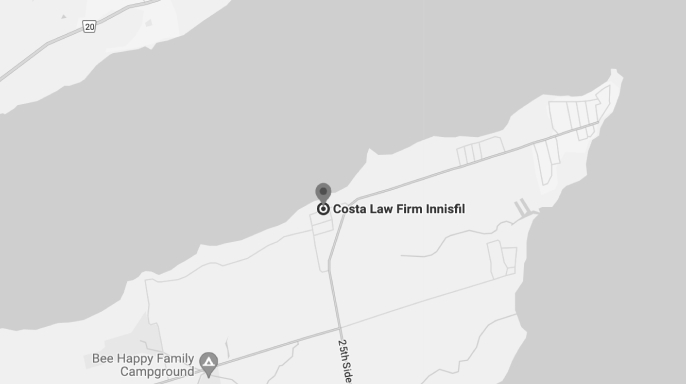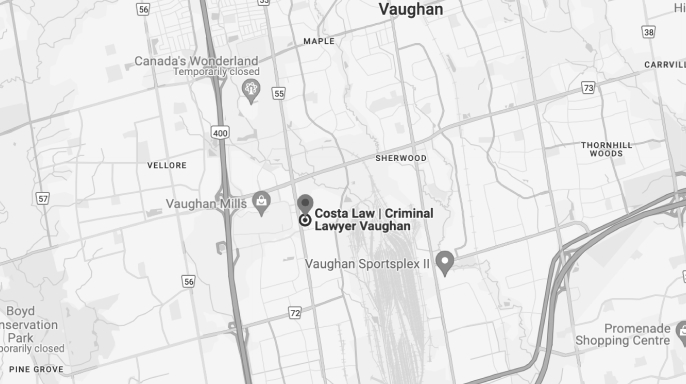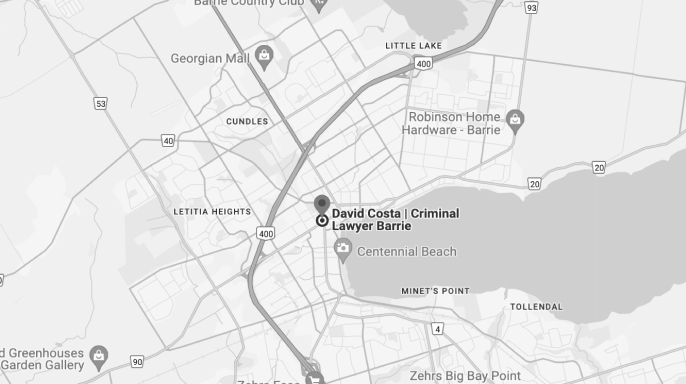Sexual Offence Lawyer
Charges involving sexual assault or any misconduct of a sexual nature carry severe consequences that extend far beyond jail term, prison sentence, or steep fines. Permanent damage to your professional and personal reputation and court-ordered sexual offender registration can forever alter your life. If you’re facing a sexual assault allegation, it’s essential to be represented by an experienced criminal lawyer.
Costa Law has a team of highly experienced lawyers who have handled many sexual offence cases successfully. Our legal professionals will fight for your rights to a fair trial and mitigate the harsh consequences associated with sexual assault charges and other related offences under the criminal code.

Understanding Sexual Offences and the Role of Our Lawyers
A sexual offence is any crime of a sexual nature or aspect. These crimes may involve threatened or actual harm and emotional or mental harm to the victim. Considering the highly reprehensive nature of sex-related offences, Canada’s Criminal Code often provides for severe penalties, including life imprisonment.
No matter the nature of the sexual assault charges you are facing, one thing is certain – it’s in your best interest to take the allegation seriously and consult a criminal lawyer who specializes in sexual assault cases. The lawyer can:
Assess your Sexual Assault Case
Before you talk to anyone about the sexual assault allegations, discuss your situation with a knowledgeable lawyer. You must have a legal professional working with you to fight for your rights from the aggressive prosecution tactics of law enforcement.
Your criminal lawyer can also begin crafting a strategic defence plan early enough based on the details and circumstances of your charge of sexual assault. Indeed, the lawyer can prepare for the legal challenges ahead.
Investigate and Gather Evidence
Most Canadians consider law enforcement the only investigative body for all crimes. However, skilled sexual crime defence lawyers often have the resources they need to gather and assess critical evidence in a sexual assault charge. They can investigate sexual offences and uncover information that could strengthen your defence.
After knowing you and understanding the circumstances of your case, our lawyers will focus their attention on uncovering evidence that could support your defence and collaborate with expert witnesses. When necessary, our lawyers can get reputable forensic experts to build a clear picture of your case and ensure a detailed analysis of the collected evidence.
Create Legal Strategy
An experienced criminal defence lawyer can assess a sexual assault charge from all perspectives and create a multifaceted defence strategy based on the facts of your case. Remember, there are many tactics our criminal lawyers can use to argue a compelling case and allow you to get a favourable outcome. Questions over consent and misidentification are some of the strategies your lawyer may consider.
Help Navigate Plea Bargains
Before a sexual assault trial, a reliable sex crime criminal defence lawyer may seek a plea bargain on behalf of their client. A plea bargain simply means the accused person avoids going to a trial by pleading guilty to a lesser crime. To determine whether a plea bargain offers a favourable outcome, our lawyers will first review the circumstances of the case and assess the strength of the prosecution’s evidence.
Whether you are charged with sexual exploitation, sexual assault, child pornography, or other sexual offences, discuss your case with the experienced lawyers at Costa Law. Your future may be on the line. We have many years of combined experience, and we are ready to fight for your freedom and protect your rights.

Types of Sexual Offences
Most people may be familiar with the sexual assault criminal offence. However, this isn’t the only sexual offence under Canada’s Criminal Code. Here are the crimes considered sexual offences.
Sexual Assault
Sexual assault includes all unwanted sexual activity, like rape, unwanted kissing, fondling, and sexual grabbing. Any sexual activity is only considered legal when the parties involved consent. Therefore, sexual touching is only legal if the person communicates their consent affirmatively, whether through conduct or words. However, passivity or silence doesn’t equal to consent.
The determination of sexual assault often involves many factors, including the nature of the sexual contact, part of the body touched, usage of force, and circumstances. For a conviction, a prosecutor must prove beyond any reasonable doubt that the accused person was involved and the offence occurred. Sexual assault can be classified as:
- Sexual assault level 1: This is an assault of a sexual nature committed such that the victim’s sexual integrity is violated. It could involve minor injuries or no injuries.
- Sexual assault level 2: This refers to sexual assault with a weapon or threats, resulting in bodily harm to the victim.
- Aggravated sexual assault: This is sexual assault that results in significant bodily harm like maiming, wounding, disfiguring, and endangering the victim’s life.
The charge of sexual assault can be treated as a serious indictable offence or less severe summary of conviction – each is associated with different penalties.
Invitation to Sexual Touching
Under the Criminal Code Section 152, it’s a criminal offence to invite, incite, and counsel a person under 16 years to touch, either indirectly or directly, their own or another party’s body with an object or directly for a sexual purpose. ‘Invitation’ may be direct (in person). It can also be made by text message, phone call, online through social media, or by any other electronic means.
Thus, the accused person may be charged with an invitation to sexual touching, whether any actual physical contact happened or not. If you are facing charges related to sex crimes involving invitation to touching, our criminal defence lawyers will assess the plaintiff’s statements about the incident and create a defence strategy. We will also consider whether the police investigation process breached any of your rights under Canada’s Charter of Rights and Freedoms.
Sexual Interference
According to Section 151 of Canada’s Criminal Code, sexual interference is defined as every person who touches, indirectly or directly, part of the body or an object, any part of the body of an individual under 16 years, for a sexual-related purpose.
To prove that the defendant is guilty of a sexual interference case, the prosecution must show the touching was intentional and for sexual purposes. As your defence counsel, we will examine the plaintiff’s statements by assessing the circumstances around the incident and any words associated with the alleged touching. This way, we will create and implement a strong defence plan for the most favourable outcomes possible.
Legal Framework: The Criminal Code and Sexual Offences
The Criminal Code clarifies what constitutes a criminal offence and the procedure involved in handling each offence. While part of the criminal law (regarding youth crimes and controlled substances) isn’t covered under the Code, other criminal acts are covered. One of those offences addressed under the code is sexual crimes or offences.
Part 5 of Canada’s Criminal Code sets out the criminal law of sexual crimes, disorderly conduct, and public morals. The reality is that the criminal law is complicated. Therefore, if you are faced with a charge of aggravated sexual assault or other sexual offences, work with an experienced lawyer who can help with your case.
At Costa Law, we understand that the legal issues and circumstances that may arise during a sexual offence case are complex. While not everyone charged with sex crimes will face conviction, it’s too much of a price to take chances.
Mistakes are occasionally made, and innocent people are charged with sex-related crimes. Luckily, you are presumed to be innocent until proven guilty, and we will provide the strongest defence possible.
Defending Sexual Assault Cases
When you are faced with a charge of sexual crime, founded or unfounded, it’s in your best interest to work with a skilled lawyer. A knowledgeable and experienced lawyer from Costa Law will focus on understanding the complications and facts involved in your case. We will guide you through the maze of legal issues and evidentiary related to the prosecution of sex-related offences.
First, Don’t Talk to the Police About the Allegations
A common misconception is that working with the police can make your sex-related case easier or give you a lighter sentence. This is far from the truth. The best course of action would be to tell the police that you need to speak to a lawyer. If you’re under arrest, the police should give you a chance to call a lawyer or a free-duty legal counsel to allow you to get the legal advice you need.
When you talk to our lawyers, they will recommend that you exercise your right to stay silent. That means ‘don’t say anything to the police.’ Suppose the police are persistently trying to question you. In that case, you should politely (yet firmly) tell them you’re exercising your right to stay silent, according to Section 7 of the Charter of Rights and Freedom and under the common law in Canada.
Even if the criminal allegations are unfounded and you’re completely innocent, there’s a possibility of hurting your chances of getting a favourable outcome if you cooperate with the police or give a statement. After all, you don’t want to say something that the prosecution could use against you during your case trial.
Defence Strategies
You have many defence options that can counter charges of sex-related crimes. If someone is accused of any other type of crime, they’ll probably profess their complete innocence to their criminal defence lawyer.
That’s not different in the case of sexual assault. Crimes of this nature are taken seriously, and the laws on such cases are complex. Therefore, working with our lawyers is recommended to mount a strong defence. This may include:
Innocence
This is the most rudimentary defence in sexual assault charges and other similar allegations. Our lawyer could argue that you were in a different location at the time of the crime – alibi. To mount a strong defence based on innocence, we will gather reliable and credible evidence to create a reasonable doubt that you were not with the alleged victim at the time of the crime.
Mistaken identity is also another common defence based on innocence. In the same way your defence lawyers can present an alibi to prove your innocence, they can offer reliable and credible evidence to create a reasonable doubt that the complainant failed to identify the correct assailant or perpetrator of the sex crime.
Consent Defence
In many cases, an individual charged with a sex-related crime will admit there was some form of sexual activity. However, their defence would be that the alleged victim consented to the sexual act in question. A fundamental component of a sexual offence case is that the conduct of the accused individual occurred against the alleged victim’s will.
Therefore, if you (the defendant) can establish a reasonable doubt that the plaintiff (the alleged victim) consented to the sexual act, you have a solid defence. Depending on the facts of the case, it can be challenging to establish consent without the help of an experienced lawyer.
Other defence options include the defence of mistaken age. Your lawyer could allege that you honestly believed that the alleged victim was of legal age to consent to the sexual activity in question. Remember, your lawyer must have taken the necessary steps to verify the victim’s true age. It’s also possible to demonstrate any contradictions in the alleged victim’s version of events and cast doubt on the veracity of the alleged acts.
Mistaken Belief in Consent
In a sex-related offence case, conviction often depends on the consent question. The jury or judge will decide whether the victim gave consent for sexual activity. While this may be a yes-or-no question, there’s a third option in some cases – honest but mistaken belief in consent.
This defence is allowed based on a ‘mistake of fact’ in committing a sex crime. To be guilty of a crime, the person accused must be aware that they’re doing something wrong at the time of the act. Therefore, if the accused individual honestly believed that the other party had given consent, he wasn’t aware that he was committing an offence.
Note that there are strict conditions you must meet when using an honest but mistaken belief as a defence. Seeking the help of a skilled criminal defence lawyer who has experience defending sexual assault charges is recommended. Our lawyers can help you (the accused) prove the following:
More than Just a Subjective Belief of Consent
Generally, it’s not enough for an accused individual to disagree on what does and doesn’t constitute consenting actions. Your lawyer will gather the right evidence or find information that proves you (the defendant) thought the sexual activity was consented and legal.
Positive and Supportive Evidence of Consent
Our lawyers understand that consent is more than the absence of non-consent. For instance, it’s not enough to argue that the plaintiff didn’t say ‘no’ or ‘stop’ or was silent. Perhaps the defendant was too frightened to speak. Passive behaviour, ambiguous conduct, or silence can’t be taken as consent.
Furthermore, implied consent doesn’t apply in sexual assault cases. Therefore, your lawyer will investigate your case and uncover any actual evidence, actions, and statements that constitute consent.
Potential for misunderstanding consent
Your lawyer must present evidence that shows equivocality or ambiguity in actions or circumstances that you may have reasonably misinterpreted as consent. For instance, you (the accused) may have mistakenly believed that the other person was reciprocating or nodding in agreement when they were gently trying to push you away.
Note that if the versions of events between the plaintiff and the defendant are so opposed that none could be considered true from various perspectives, the mistaken belief of consent isn’t admissible. Furthermore, the law requires that all the circumstances surrounding a mistaken consent must have the ‘air of reality’ – shouldn’t be farfetched.
Navigating Sexual Assault Trials and Court Proceedings
In reality, the choice of pressing sexual-related charges isn’t up to the victim. Once the alleged victim reports a sex-related offence to the law enforcement officials, the decision of whether or not to lay charges is made by the law enforcement office.
Once the police lay the charges, the prosecution office assumes complete carriage of the case file and makes all relevant decisions to continue with the prosecution, depending on whether there’s a reasonable prospect of conviction.
The prosecution office will consult the alleged victim to determine whether the case will proceed to a court trial, be withdrawn, or be resolved through a guilty plea. However, the decision-making power rests on the prosecution office and not the alleged victim. In Canada, the victim is often considered a witness who can offer testimony and evidence to the alleged sex crime and not a key decision-maker regarding how the case is prosecuted in court.
Definition of Sexual Assault
When it comes to determining if the definition of sexual assault will be applied, your case can become very complicated. Canada’s Criminal Code lays a clear definition of these offences and offers precise punishment.
Thus, even a threat of a sex-related act can be considered an offence of a sexual nature. That’s why you need an experienced lawyer to protect your rights from the moment you are made aware of the allegations against you until the end of your case.
Consent
Another complex issue involves ascertaining consent. The central matter in determining if a sexual offence occurred is to establish whether the alleged victim consented to the sexual activity in question. The prosecution must prove beyond a reasonable doubt that the plaintiff (victim) didn’t consent. According to Canada’s Criminal Code s.273.1(1), consent is the voluntary agreement to engage in any activity of a sexual nature.
The defence of consent can be challenging unless you have an experienced lawyer on your side. Our skilled lawyers can investigate the facts of your case and provide credible information that raises reasonable doubt by contradicting the coercive nature of the sex actions alleged. Indeed, we can show an error of fact based on a genuine belief of the defendant (the accused) to dispel the criminal aspect of the sex-related actions in question.
Sentencing
Once it’s determined that the definition of sexual assault applies to your charges and the prosecution proves beyond a reasonable doubt that consent wasn’t given, the case will move to the sentencing phase. The severity of the punishment majorly depends on the facts of the case and partly on the criminal history of the defendant.
For instance, suppose a first-time offender is found guilty of a date rape where injuries didn’t occur, and there were no aggravated facts. In that case, the offender would likely face a 2-3 years jail term, depending on the facts of the case and the offender’s background.
However, if the victim is physically wounded, disfigured or maimed, or their life is endangered, the offender may be convicted of an aggravated sexual assault. The penalties will be more severe, and if a firearm is involved, the jail term may escalate further.
Fighting Against Sexual Offense Charges
If you’re under investigation, arrested or even charged in a criminal case involving allegations of sex-related offences, hire a skilled criminal defence lawyer. We will quickly gather the facts of the case, assess the available information, and map out the best possible action plan to help you win the case or get the most favourable outcome.
The stakes involved in sexual assault charges are high. Thus, you need to work with our dedicated lawyers, who are prepared to go to great lengths to win your case within the laws of Canada’s court system and the Law Society’s ethical bounds.
Consequences of Sexual Offences
Upon conviction of sexual assault, you’ll have a stained criminal record and be placed in the sex offenders registry. Sex crimes often carry a negative stigma that affects nearly all aspects of a person’s life. They make it challenging and sometimes impossible to get a job. Some landlords may be hesitant to rent you even after serving your sentence. Furthermore, your ability to travel outside the country will be significantly compromised.
Penalties
Here are the possible penalties for sexual-related offences:
- Sexual assault (victim younger than 16 years) – A minimum of 1 year imprisonment up to 14 years imprisonment.
- Sexual assault (victim over 16 years) – up to 10 years imprisonment.
- Sexual assault causing bodily harm, particularly with a restricted or prohibited firearm – 5 years imprisonment (first offence), 7 years for a second offence and up to 14 years.
- Aggravated sexual assault – minimum of 5 years in prison and up to life imprisonment.
- Sexual interference – a minimum of 1 year imprisonment (sentence by indictment) or 90 days by summary conviction (up to 18 months in prison).
- Invitation to sexual counselling – a minimum of a year in prison and a maximum of 14 years (by indictment) or 90 days imprisonment by a summary of conviction (up to 2 years).
- Sexual exploitation – minimum of a year in prison and a maximum of 14 years by indictment or 90 days imprisonment, up to 2 years in prison by summary of conviction).
Ruined Reputation
An allegation of even low-level sex-related crime, such as briefly touching another individual’s buttocks can ruin your reputation and personal and professional life. In some cases, such accusations can make it challenging for you to complete your education. Once the accusation becomes a formal charge, there’s a chance you will never recover some aspects of your life.
Therefore, you must prove your innocence to get the opportunity to pick up the pieces and probably move forward. Our skilled lawyers can help you fight all false allegations of sexual crimes and retain your reputation.
Appearing in the Sex Offender Registry
Any individual convicted of sexual assault is placed on the Ontario and national sex offender registry. The sex offender registry orders often last for ten years, two decades, or life, depending on the severity of the sexual crime they committed. The person placed under a sex offender registry has a reporting obligation and is required to follow all the rules of the sex offenders registry.
Note that the entire sex offender registry isn’t public and allows the police to track sex offenders. It provides information about each registered offender, including their name, valid ID, address, contact information, details of the convicted offences, and more. Some of the offences where judges issue sex offender registry orders include:
- Sexually assaulting children
- Invitation to sexual touching
- Sexual assault with a weapon
- Certain sexual offences that involve obtaining prostitution of an individual under 18 years
- Sexual exploitation (14 years to 18 years)
- Incest
- Voyeurism
- Child pornography offences
Other offences that might get someone’s name in the sex offenders registry include indecent exposure to an individual under 14 years, overpowering for sexual purposes, guardian or parent procuring sexual activity, and more. People convicted of luring children using computer systems, bestiality, or living on the avails of prostitution, especially of a person under 18 years, may be ordered to register in the sex offenders registry.
Failure to comply with the sex offender registry requirements can result in hefty fines ($25,000) and a 1-year sentence for your first offence. For all subsequent offences, the penalty is $25,000 and not more than 2 years less a day.
Perhaps you are wondering if you can get your name off the sex offenders registry in Ontario. To get your name off the registry, you must be successful in appealing your sexual assault conviction and secure an acquittal. If you were convicted wrongly and are innocent, our lawyers can assess the available case information, investigate the incident, and help you file an appeal.
Remember, even if you apply for an early termination successfully, whether through government pardon or record suspension, it will only absolve you from reporting requirements. However, your information will remain in the sexual offenders registry.
Having an experienced sexual assault lawyer in Toronto on your side could make a significant difference in your case outcome. Perhaps it can keep your name off the sex offenders registry, particularly if you are falsely accused.
Request A Consultation
Testimonials
What our clients are saying
Contact Us
Costa Law Firm
Costa Law Firm is a law firm located in Toronto with exceptional credentials that stands out for its commitment to client service. Our service minded approach has led Costa Law Firm to be one of the most reliable law firms in Toronto.
Address
Main Office:
1015 Bloor Street West, Toronto, Ontario M6H 1M1
Phone: (416) 535-6329
Fax: 416-535-4735
info@costalawfirm.ca
We provide emergency services for urgent matters.
Consultation Office:
17075 Leslie St Unit 6, Newmarket, ON L3Y 8E1Vaughan location 290 Caldari Rd Unit 8, Concord, ON L4K 4J4, CanadaBarrie location 49 High St 3rd floor, Barrie, ON L4N 5J4, Canada











